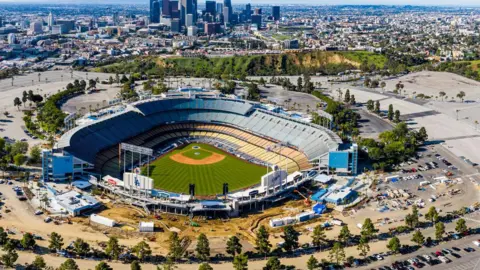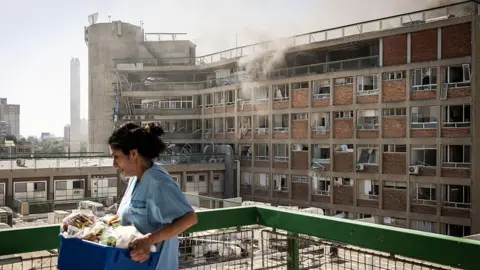- Local
Condemnation and anger at the UNSC after Israeli strikes on Iran
时间:2010-12-5 17:23:32 作者:Leadership 来源:Interviews 查看: 评论:0内容摘要:Tehran is yet to respond to the latest allegations from the BBC. The Iranian regime has previously been accused of conducting unlawful operations against journalists abroad.Tehran is yet to respond to the latest allegations from the BBC. The Iranian regime has previously been accused of conducting unlawful operations against journalists abroad.
Last autumn, audience numbers were up 70% on the year before and a new strategy from local authorities is promising a hefty investment in its building.But the scene across Oxfordshire is not always as rosy, with funding and access to affordable arts spaces sometimes proving a sticking point.

The Covid pandemic was a tough time for arts venues.They had to deal with closures, adapting to virtual performances and keeping on top of costs.For places like Unicorn Theatre in Abingdon and the Kenton Theatre in Henley-on-Thames, this was made far harder by the high running costs of their old buildings.

"We had to pretty much shut down for over a year, and you've got to pay all the costs of running the building," said Greg Bensberg, chair of Abingdon Abbey Buildings Trust, which houses the Unicorn."We staggered on through there but Covid was really bad."

Lottie Pheasant, theatre manager at the Kenton, said the pandemic had nearly brought the venue to its knees.
"Two years ago, we were close to having to close," she said. "That year, we filed a nearly £190,000 loss.""Is it just and equitable to give them what they want? I don't think that's in the interest of the broader community or the state," Macpherson said.
Giving another example, Macpherson said that some of South Africa's inner cities were in a "disastrous" condition. After owners left, buildings were "over-run" and "hijacked" for illegal occupation. The cost to the state to rebuild them could exceed their value, and in such cases the courts could rule that an owner qualified for "nil compensation", he said."Nil is a form of compensation," Macpherson added, while ruling it out for farms.
Johannesburg mayor Dada Morero told South Africa's Mail & Guardian newspaperHe added the owners of nearly 100 buildings could not be located.
- 最近更新
- 2025-07-07 11:41:32A soccer mystery: Why mighty China fails at the world's biggest sport
- 2025-07-07 11:41:32'I'm autistic and my orchestra helps me be myself'
- 2025-07-07 11:41:32Australian woman on trial for mushroom murder of in-laws says she was trying to fix a 'bland' lunch
- 2025-07-07 11:41:32200-year-old condom decorated with erotic art goes on display in Amsterdam
- 2025-07-07 11:41:32UK sea temperatures soar after exceptionally warm spring
- 2025-07-07 11:41:32Veteran has 'burning fire' to correct pension 'robbery'
- 2025-07-07 11:41:32Sinner beats Bublik, reaches 2nd straight French Open semifinal
- 2025-07-07 11:41:32Draisaitl scores in OT as Oilers beat Panthers in Stanley Cup Final Game 1
- 热门排行
- 2025-07-07 11:41:32Pesto Shrimp with Cherry Tomatoes
- 2025-07-07 11:41:32UK car making plunges to lowest for over 70 years
- 2025-07-07 11:41:32Car insurance myths: Red cars, rate negotiations and other popular misconceptions
- 2025-07-07 11:41:322 killed in helicopter crash on Alaska’s remote North Slope, NTSB says
- 2025-07-07 11:41:32Gap insurance: How it works — and when the coverage is worth the cost
- 2025-07-07 11:41:32Resilience lunar lander from Japan heads for moon touchdown
- 2025-07-07 11:41:32Interest rates on 60-month new car loans in the United States from January 2014 to May 2025
- 2025-07-07 11:41:32'We make more money from weddings now than farming'
- 友情链接
- Gallery raising £3.8m for Hepworth 'masterpiece' Debt and trade issues weaken UK growth, OECD says Burundi's ruling party seeks to tighten grip on power China says US has 'severely violated' tariffs truce Cologne defuses WW2 bombs after 20,000 evacuated Disney makes hundreds more layoffs as it cuts costs 'Hidden stories' of oldest town house to be told Are the surprise airfield attacks a turning point for Ukraine? Museum closes for a day due to a lack of volunteers Unseen works by distinctive artist to be auctioned Archaeologists seek volunteers to sort city history China says US has 'severely violated' tariffs truce When joy turned to horror for Bengaluru fans celebrating team's IPL win TikTok Shop food listings 'putting people at risk' Burundi's ruling party seeks to tighten grip on power 'Hidden stories' of oldest town house to be told Disney makes hundreds more layoffs as it cuts costs Debt and trade issues weaken UK growth, OECD says China says US has 'severely violated' tariffs truce Judge halts deportation of Colorado suspect's family When joy turned to horror for Bengaluru fans celebrating team's IPL win US vetoes UN call for unconditional Gaza ceasefire Rare oil portrait of Mahatma Gandhi to be auctioned in London When joy turned to horror for Bengaluru fans celebrating team's IPL win North Face and Cartier customer data stolen in cyber attacks US vetoes UN call for unconditional Gaza ceasefire Burundi's ruling party seeks to tighten grip on power Putin will seek revenge for Ukraine drone attack, warns Trump Are the surprise airfield attacks a turning point for Ukraine? Cologne defuses WW2 bombs after 20,000 evacuated
